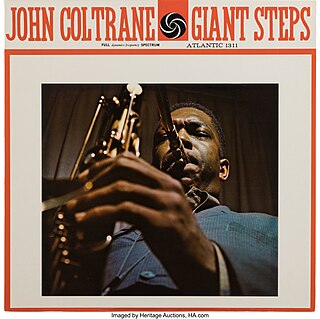
Giant Steps is a studio album by the jazz musician John Coltrane. It was released in February 1960 through Atlantic Records. This was Coltrane's first album as leader for the label, with which he had signed a new contract the previous year. The record is regarded as one of the most influential jazz albums of all time. Many of its tracks have become practice templates for jazz saxophonists. In 2004, it was one of fifty recordings chosen that year by the Library of Congress to be added to the National Recording Registry. It attained gold record status in 2018, having sold 500,000 copies.
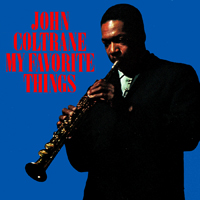
My Favorite Things is a studio album by the jazz musician John Coltrane. It was released in March 1961 on Atlantic Records. It was the first album to feature Coltrane playing soprano saxophone. An edited version of the title track became a hit single that gained popularity in 1961 on radio. The record became a major commercial success.

Coltrane Plays the Blues is an album of music by the jazz musician John Coltrane. It was released in July 1962 by Atlantic Records. It was recorded at Atlantic Studios during the sessions for My Favorite Things, assembled after Coltrane had stopped recording for the label and was under contract to Impulse Records. Like Prestige Records before them, as Coltrane's fame grew during the 1960s, Atlantic used unissued recordings and released them without either Coltrane's input or approval.

Interstellar Space is a studio album by the American jazz saxophonist John Coltrane, featuring the drummer Rashied Ali. It was recorded in 1967, the year of his death, and released by Impulse! Records in September 1974.

Coltrane's Sound is an album credited to the jazz musician John Coltrane, recorded in 1960 and released in 1964 on Atlantic Records, catalogue SD 1419. It was recorded at Atlantic Studios during the sessions for My Favorite Things, assembled after Coltrane had stopped recording for the label and was under contract to Impulse! Records. Like Prestige and Blue Note Records before them, as Coltrane's fame grew during the 1960s Atlantic used unissued recordings and released them without either Coltrane's input or approval.

Africa/Brass is a studio album by the jazz saxophonist and composer John Coltrane. It was released on September 1, 1961 through Impulse! Records. Coltrane's working quartet is augmented by a larger ensemble that brings the total to twenty-one musicians. Its big band sound, with the unusual instrumentation of French horns and euphonium, presented music very different from anything that had been associated with Coltrane to date. While critics originally gave it poor ratings, more recent jazz commentators have described it as "amazing" and as a "key work in understanding the path that John Coltrane's music took in its final phases." It is Coltrane's first release for Impulse!.

Coltrane Jazz is a studio album by the jazz musician John Coltrane. It was released in early 1961 on Atlantic Records. Most of the album features Coltrane playing with his former Miles Davis bandmates, pianist Wynton Kelly, bassist Paul Chambers and drummer Jimmy Cobb during two sessions in November and December, 1959. The exception is the track "Village Blues", which was recorded October 21, 1960. "Village Blues" comes from the first recording session featuring Coltrane playing with pianist McCoy Tyner and drummer Elvin Jones, who toured and recorded with Coltrane as part of his celebrated "classic quartet" from 1960 to 1965.

First Meditations (for quartet) is an album by John Coltrane recorded on September 2, 1965, and posthumously released in 1977. It is a quartet version of a suite Coltrane would record as Meditations two months later with an expanded group. Along with Sun Ship, recorded a week earlier, First Meditations represents the final recordings of Coltrane's classic quartet featuring pianist McCoy Tyner, bassist Jimmy Garrison, and drummer Elvin Jones.
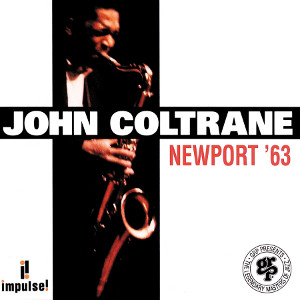
Newport '63 is a live album by jazz musician John Coltrane recorded at the 1963 Newport Jazz Festival, with one additional track recorded at the Village Vanguard in 1961. The album features the Coltrane quartet with drummer Roy Haynes substituting for Elvin Jones.

Kulu Sé Mama is an album by the jazz musician John Coltrane. Recorded during 1965, it was released in January 1967 as Impulse! A-9106, and was the last album released during Coltrane's lifetime.
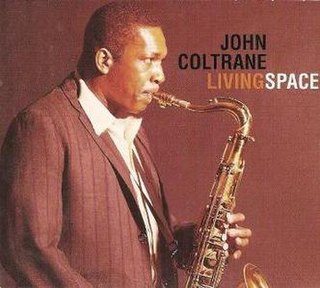
Living Space is a compilation album by jazz musician John Coltrane. Released posthumously by Impulse! Records on March 10, 1998, it features pieces recorded in 1965. Almost all of them had been previously issued on the Kulu Sé Mama CD reissue and on The Mastery of John Coltrane, Vol. 1: Feelin' Good. The only previously unissued track is "Last Blues".

To the Beat of a Different Drum is a double album by jazz musician John Coltrane released posthumously in 1978. It is a compilation of recordings in which Roy Haynes replaced Coltrane's regular drummer Elvin Jones.
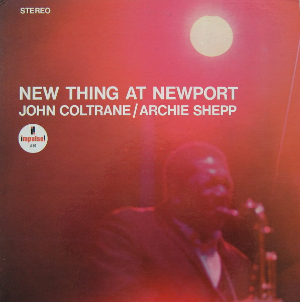
New Thing at Newport is a 1965 live album featuring two separate sets from that year's Newport Jazz Festival by tenor saxophonists John Coltrane and Archie Shepp. It was recorded four days after the recording session for Coltrane's album Ascension, on which Shepp appeared, and is one of several albums documenting the end stages of Coltrane's "classic quartet," which would begin to break up by the end of that year with the departure of McCoy Tyner.

Selflessness Featuring My Favorite Things is a posthumous album by jazz musician John Coltrane, released in 1969. The album juxtaposes two tracks recorded live at the 1963 Newport Jazz Festival with a single track ("Selflessness") recorded in a studio in Los Angeles in 1965.

The Best of John Coltrane is a 1970 compilation album released by Atlantic Records collecting recordings made by jazz saxophonist John Coltrane. The album was released shortly after his death as a part of the "Atlantic Jazz Anthology"—a series of greatest hits compilations for Atlantic jazz artists—and features performances from his brief period recording for Atlantic with new liner notes by jazz journalist Nat Hentoff.

The Mastery of John Coltrane, Vol. III: Jupiter Variation is a compilation album by American saxophonist John Coltrane, which features pieces recorded in 1966 and 1967, but not released until 1978 on Impulse! Records as IA 9360. All tracks were previously unreleased, at the time of release. "Number One" may also be found on the CD reissue of Expression, while "Jupiter (Variation)" and "Leo" may be found on the reissue of Interstellar Space. "Peace on Earth", with posthumous overdubbings, can be found on Infinity. The version here is the original.
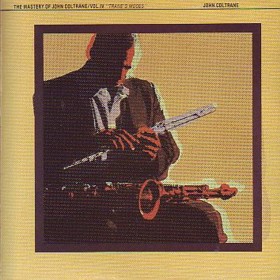
The Mastery of John Coltrane, Vol. IV: Trane's Modes is a compilation album by American saxophonist John Coltrane, released as a double LP in 1979. It features pieces recorded in 1961, two in studio and the remainder live. All the tracks were previously unissued, at the time of release. At present, "Africa " and "The Damned Don't Cry" may be found on the two-disc reissue of Africa/Brass, while all the live pieces have been included on The Complete 1961 Village Vanguard Recordings.

Both Directions at Once: The Lost Album is a studio album recorded by saxophonist John Coltrane for Impulse! Records that was first released in 2018. The recordings were made in 1963 during Coltrane's Classic Quartet period and lost for decades.

My Favorite Things: Coltrane at Newport is a compilation album by jazz musician John Coltrane released by Impulse! in 2007. It brings together tracks from performances by Coltrane's quartet at the Newport Jazz Festival in Newport, Rhode Island on July 7, 1963, and July 2, 1965.

Dear Old Stockholm is a compilation album by jazz musician John Coltrane released by GRP and Impulse! in 1993. The music, which was recorded on April 29, 1963 and May 26, 1965 at Van Gelder Studio in Englewood Cliffs, NJ, features Coltrane's quartet with Roy Haynes substituting for Elvin Jones on drums.


















